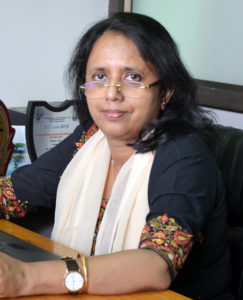
MIPS Seminar
2:00-2:45 PM | Prof. Pawel Moskal
“Positronium Imaging with the J-PET Scanner”
Head of the Department of Experimental Particle Physics and Applications
Marian Smoluchowski Institute of Physics
Jagiellonian University, 30-348 Krakow, Poland
2:45-3:30 PM | Prof. Ewa Stepien
“Preclinical studies of positronium and extracellular vesicles biomarkers”
Head of the Department of Medical Physics
Marian Smoluchowski Institute of Physics
Jagiellonian University, 30-348 Krakow, Poland
ABSTRACT
As modern medicine develops towards personalized treatment of patients, there is a need for highly specific and sensitive tests to diagnose disease. Our research aims at improvement of specificity of positron emission tomography (PET) in assessment of cancer by use of positronium as a theranostic agent. During PET scanning about 40% of positron annihilations occur through the creation of positronium. “Positronium,” which may be formed in human tissues in the intramolecular spaces, is an exotic atom composed of an electron from tissue and the positron emitted by the radioinuclide. Positronium decay in the patient body is sensitive to the nanostructure and metabolism of human tissues. This phenomenon is not used in present PET diagnostics, yet it is in principle possible to exploit such environment modified properties of positronium as diagnostic biomarkers for cancer assessment. Our first in-vitro studies have shown differences of the positronium mean lifetime and production probability in healthy and cancerous tissues, indicating that they may be used as indicators for in-vivo cancer classification. For the application in medical diagnostics, the properties of positronium atoms need to be determined in a spatially resolved manner. For that purpose we have developed a method of positronium lifetime imaging in which the lifetime and position of positronium atoms are determined on an event-by-event basis. This method requires application of β+ decaying isotope that also emits a prompt gamma ray. We will argue that with total-body PET scanners, the sensitivity of positronium lifetime imaging, which requires coincident registration of the back-to-back annihilation photons and the prompt gamma, is comparable to the sensitivities for metabolic imaging with standard PET scanners.
Our research involves also development of diagnostic methods based on the extracellular vesicles (EVs), which are micro and nano-sized, closed membrane fragments. They are produced by native cells to facilitate the transfer of different signaling factors, structural proteins, nucleic acids or lipids even to distant cells. They are present in all body fluids and they are specific to their parental cells.
Our presentation will be divided into two parts. In the first, the method of positronium imaging and the pilot positronium images obtained with the J-PET detector (the first PET system built based on plastic scintillators) will be reported. This part of the presentation will include also description and perspectives of development of the J-PET technology in view of total-body PET imaging. The second part will concern preliminary results of the preclinical studies of positronium properties in cancerous and healthy tissues sampled from patients as well as in the frozen and living healthy and cancer skin cells in-vitro. The second part will include also description of the novel method for the diagnosis of diabetes and melanoma based on EVs used as biomarkers and drug delivery systems.
References:
P. Moskal, …. E. Ł. Stępień et al., Phys. Med. Biol. 64 (2019) 055017
- Moskal, B. Jasinska, E. Ł. Stępień, S. Bass, Nature Reviews Physics 1 (2019) 527
- Roman M… .E. Ł. Stępień, Nanomedicine 17 (2019) 137
- Ł. Stępień et al., Theranostics 8 (2018) 3874
Hosted by: Craig Levin, Ph.D.
Sponsored by the Molecular Imaging Program at Stanford and the Department of Radiology

Tessa Cook, MD, PhD
Assistant Professor of Radiology
Perelman School of Medicine
University of Pennsylvania
Title: Deploying AI in the Clinical Radiology Workflow: Challenges, Opportunities, and Examples
Abstract: Although many radiology AI efforts are focused on pixel-based tasks, there is great potential for AI to impact radiology care delivery and workflow when applied to reports, EMR data, and workflow data. Radiology-pathology correlation, identification of follow-up recommendations, and report segmentation can be used to increase meaningful feedback to radiologists as well as to automate tasks that are currently manual and time-consuming. When deploying AI within the clinical workflow, there are many challenges that may slow down or otherwise affect the integration. Careful consideration of the way in which radiologists may expect to interact with AI results should be undertaken to meaningfully deploy radiology AI in a safe and effective way.

Please note this seminar is now cancelled and will be rescheduled for a later date.
MIPS Seminar: Investigating and Imaging key molecular switches associated with Acquirement of Platinum-Taxol resistance in Epithelial Ovarian Cancer
Pritha Ray, Ph.D.
Principal Investigator & Scientific Officer F
Imaging Cell Signaling & Therapeutics Lab
ACTREC, Tata Memorial Center
Navi Mumbai, India

Thursday MIPS Roundtable: “Ask the Radiologist about COVID-19”
Hosted by Dr. Heike Daldrup-Link & Dr. Gunilla Jacobson
Join us virtually to ask anything you would like to know about COVID-19 and the current status in our community. This week we will open the floor for questions. Please prepare questions related to COVID-19. Feel free to submit questions in advance to Ashley Williams (ashleylw@stanford.edu) or submit them in the chat on Zoom.
Meeting URL: https://stanford.zoom.us/j/186504700
Dial: +1 650 724 9799 or +1 833 302 1536
Meeting ID: 186 504 700c talking about the future of medicine and science.

Thursday MIPS Roundtable
Hosted by Dr. Kathy Ferrara & Dr. Gunilla Jacobson
Join us virtually to ask anything you would like to know about career plans, collaborations, new expertise and online lectures during the shutdown. Feel free to submit questions in advance to Ashley Williams (ashleylw@stanford.edu) or submit them in the chat on Zoom.
1:30-2:00 PM | Dr. Kathy Ferrara, Ph.D.
“Developing a career plan, collaborations and new expertise during the shutdown”
Professor of Radiology
Stanford University
2:00-2:30 PM | Dr. Angie Louie, Ph.D.
“How to create online lectures using Camtasia, Playposit and Canvas”
Professor of Biomedical Engineering
UC Davis
Meeting URL: https://stanford.zoom.us/j/186504700
Dial: +1 650 724 9799 or +1 833 302 1536
Meeting ID: 186 504 700

Thursday MIPS Roundtable: ePad: A Web-based Imaging Informatics Platform for Image Annotation and Quantitative Analysis
Come learn about ePAD (https://epad.stanford.edu) from Dr. Rubin’s lab, a freely-accessible web-based informatics platform for universal access to radiology images, annotations, and quantitative analysis. We’ll also open the floor to a discussion on integrating ePAD into the SCi3 preclinical imaging workflow and how together we can crowdsource data sharing and reuse, and accelerate quantitative imaging research for everyone.
Daniel Rubin, PhD
Professor of Biomedical Data Science, of Radiology, of Medicine, and, by courtesy, Ophthalmology and of Computer Science
Jason Thanh Lee, PhD
Director of the Clark Center Facility
Laura Pisani, PhD
Associate Director of the Clark Center Facility
Frezghi Habet, PhD
Director of the Porter Drive Facility
MIPS Roundtables will be every Thursday from 1:30-2:30pm showcasing various topics and are open to all interested.
Please note Zoom information does change week to week.
4/9 Meeting URL: https://stanford.zoom.us/j/114866791
Dial: +1 650 724 9799 or +1 833 302 1536
Meeting ID: 114 866 791

Thursday MIPS Roundtable: Dr. Michelle James & Dr. Ted Graves
1:30-2:00 PM – Michelle L. James, Ph.D.
Neuroimmune Imaging Research and Discovery (NiRD) Lab
Assistant Professor of Radiology and of Neurology
Stanford University
2:00-2:30 PM – Edward “Ted” Graves, Ph.D.
Imaging Radiobiology Laboratory, Division of Radiation Oncology Medical Physics
“Using Imaging to Study Radiation Biology”
Associate Professor of Radiation Oncology (Radiation Physics) and, by courtesy, of Radiology
Stanford University
MIPS Roundtables will be every Thursday from 1:30-2:30pm showcasing various topics and are open to all interested.
Please note Zoom information does change week to week.
4/16 Meeting URL: https://stanford.zoom.us/j/406957830
Dial: +1 650 724 9799 or +1 833 302 1536
Meeting ID: 406 957 830

Please note this seminar is now cancelled and will be rescheduled for a future date. Please contact Ashley Williams (ashleylw@stanford.edu) with any questions or concerns. Thank you for your understanding!
IMAGinING THE FUTURE: “Journey Through Academia, Government and Industry: Lessons Learned”
Elias Zerhouni, M.D.
Professor Emeritus
John Hopkins University

Radiomics and Radio-Genomics: Opportunities for Precision Medicine
Zoom: https://stanford.zoom.us/j/99904033216?pwd=U2tTdUp0YWtneTNUb1E4V2x0OTFMQT09
Pallavi Tiwari, PhD
Assistant Professor of Biomedical Engineering
Associate Member, Case Comprehensive Cancer Center
Director of Brain Image Computing Laboratory
School of Medicine | Case Western Reserve University
Abstract:
In this talk, Dr. Tiwari will focus on her lab’s recent efforts in developing radiomic (extracting computerized sub-visual features from radiologic imaging), radiogenomic (identifying radiologic features associated with molecular phenotypes), and radiopathomic (radiologic features associated with pathologic phenotypes) techniques to capture insights into the underlying tumor biology as observed on non-invasive routine imaging. She will focus on clinical applications of this work for predicting disease outcome, recurrence, progression and response to therapy specifically in the context of brain tumors. She will also discuss current efforts in developing new radiomic features for post-treatment evaluation and predicting response to chemo-radiation treatment. Dr. Tiwari will conclude with a discussion on her lab’s findings in AI + experts, in the context of a clinically challenging problem of post-treatment response assessment on routine MRI scans.

Thursday MIPS Roundtable: Thera(g)nostics: Current clinical use and future needs
1:30-2:15 PM | Dr. Carina Mari Aparici, M.D.
Thera(g)nostics: Current clinical use and future needs
Bringing the clinical needs with preclinical research efforts
Clinical Professor of Radiology – Nuclear Medicine
Director, Targeted Radionuclide Therapy Program
Stanford University
2:15-2:30 PM | Dr. Gunilla Jacobson, Ph.D.
MIPS Theranostics Interest Group
How to join and learn more
Deputy Director
Molecular Imaging Program at Stanford, Radiology
Stanford University
MIPS Roundtables will be every Thursday from 1:30-2:30pm showcasing various topics and are open to all interested.
Please note Zoom information does change week to week.
4/23 Meeting URL: https://stanford.zoom.us/j/639510777
Dial: +1 650 724 9799 or +1 833 302 1536
Meeting ID: 639 510 777